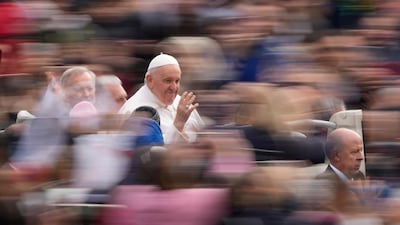It has been ten years since the election of Argentina's Jorge Mario Bergoglio as Pope Francis. In that decade he has accomplished a remarkable undertaking: launching a profound transformation of the 2,000-year-old Catholic Church.
The very election of Pope Francis was a great novelty, for at least two reasons.
First, the pope had never before been a Jesuit - that is, a member of the Society of Jesus, a powerful religious order in the 16th and 17th centuries with a global DNA, but which was harshly attacked by the European powers, especially in the age of the Enlightenment.
Massimo Faggioli, a professor in the department of theology and religious studies at Villanova University in Philadelphia, points out that Pope Francis "thinks and acts like a Jesuit”. Throughout the history of Catholicism, the Jesuit order has always operated at the limits and frontiers of the Church, “both geographically and intellectually and ideologically," he told The National ahead of the Pope's ten-year anniversary, which takes place on Monday.
The second novelty is that in nearly 1,300 years, a man born outside Europe had never been elected pope. According to Angelo Manfredi, a priest and professor of Church history at the Higher Institute of Religious Sciences in Milan, it is no coincidence that one of the most powerful messages of Pope Francis is have a "listening, missionary spirit, capable of a healthy cultural cross-fertilisation”. He told The National the Church now “changes as she walks with the people of the five continents”.
By its very nature, the Catholic Church has always been global. The very term 'Catholic' comes from the ancient Greek 'katholikos', universal. But Pope Francis immediately made it clear, notes Prof Faggioli, "that for him, Europe and North America no longer define the cultural and theological boundaries of Catholicism. This pope's reading of the world is from the south."
10 years of Pope Francis - in pictures
Vatican sources tell The National that thanks to Pope Francis, the Eurocentric legacy of past centuries has finally been overcome. He has given much more space to interreligious dialogue than his predecessors by focusing on the non-Western world.
Roberto Catalano, professor in the department of Theology, philosophy and human sciences at the Sophia University Institute, observes: "From the very beginning, Pope Francis has spoken of a culture of dialogue and encounter, especially dialogue between religions". This is evident in the path taken to re-establish relations with Al Azhar University, the friendship with Sheikh Ahmed El Tayeb, Grand Imam of Al Azhar, the subsequent signing in Abu Dhabi of the document on human fraternity for world peace and living together, and the visit to many Muslim majority countries. "There is a whole policy and agenda that he is following, which seems to me very logical, very open and aimed at dialogue," says Prof Catalano.
Pope Francis has made the Church much more attentive to the big issue of global imbalances. According to Gino De Vecchis, honorary professor of geography at Rome's Sapienza University, "Francis's view of the world focuses on inequality. In April 2014, he tweeted that 'inequality is the root of social evils'. The Pope's thoughts dwell on the ways in which globalisation has deepened - and continues to deepen - economic divides".
The pontiff's gestures of concern for the poor and suffering around the world have been many over the past decade. Immediately after the earthquake in Turkey, for example, he sent food and aid. And the Apostolic almoner, Cardinal Konrad Krajewski, visited the country, just as he has travelled several times in the past to war-torn Ukraine.
The Pope has also made the Catholic Church greener. For Pope Francis, 'the earth is an environment to be safeguarded, a garden to be cultivated', and his encyclical letter Laudato si' (Praise be to You) was very popular not only with Catholics, but with environmentalists around the world. According to De Vecchis: "Francis exhorts everyone to see the world through the eyes of God the Creator. And this is precisely why man’s relationship with nature must not be influenced by greed and exploitation, but must preserve the divine harmony between creatures and creation."
The oldest church in the Gulf welcomes Pope Francis
In his 2013 apostolic exhortation Evangelii gaudium (The Joy of the Gospel), Pope Francis urged the Church to “embark on a new chapter of evangelism”.
Catholics expecting a revolution may have been disappointed but, according to Prof Manfredi, the pope has brought genuine change and not just put ‘his men’ into power. He has done what he theorized by "'initiating processes rather than possessing spaces”.
"He tried to overcome the top-down centralization that prevailed in Rome for historical reasons," Prof Manfredi says. "He initiated a process of transparency both in the administrative management and in the analysis of many past events, such as cases of abuse in many churches. He also offered more room to lay people and women."
Not everyone in the Catholic Church has appreciated Francis' innovations. But one thing is certain: even after the end of this papacy, the world of Catholicism will be a different place.



























